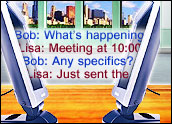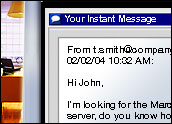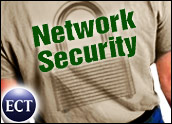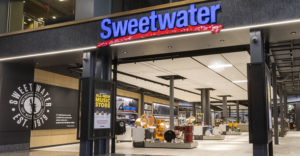
Today’s corporations — both large and midsize — increasingly are turning over the operation and support of network- and Web-based applications to managed-hosting companies. These businesses specialize in providing high levels of uptime, protecting their clients’ data from malware and intrusion and freeing up internal IT departments to pursue other initiatives.
Rackspace Managed Hosting focuses only on managed hosting services and solutions for companies that range from midsize businesses to Fortune 100 companies. The San Antonio-based corporation has been profitable for four of its five years in business and continues to see revenue increase up to 60 percent annually through its organic growth strategy. Pretax profits in 2003 grew 134 percent versus the prior year.
Earlier this year, market research firm Frost & Sullivan named Rackspace’s Intensive Hosting its product of the year. At a time when network attacks have increased, budget strings are loosening and businesses aggressively vie to compete, Rackspace has unveiled a new level for its Intensive Hosting package that gives clients the ability to rely on a complete managed software stack, including database servers and application frameworks.
Two of the biggest challenges facing Lanham Napier, president of Rackspace, and his executive team are managing the company’s growth and finding the best-qualified employees to join the corporate team. E-Commerce Times spoke with Napier about some of the challenges facing the company.
E-Commerce Times: Would you mind spending a few minutes describing Rackspace, who you are and what you do?
Napier: We are — I’m knocking on my fake wood desk here — one of the survivors in this industry. Everybody knows about the tech wreck and the barren landscape there, but what’s happened is we just find ourselves in a fantastic position — so that, as our competitors have failed over the past few years, we’ve been able to really reinvest in what we do as a hosting provider.
The way I view the landscape today is that we look out there and we see companies that are generalists — we compete with AT&T and IBM, and those are companies that are big monoliths. For them, hosting is just one page of their book. And then you have somebody like Rackspace who’s a specialist.
Hosting is all we do. We are a single-product-focused company, and it’s called hosting. As a result of that, we love this business. We understand it’s a service business. It’s a technology service business, not just a technology business. Because we have specialized on it, there are a thousand things we do to run this business differently than somebody like IBM or AT&T would.
So what’s happened is we’re growing 50 [percent] to 60 percent a year, from a revenue perspective, and that’s all organic. We haven’t acquired anyone.
We grow a customer at a time; it tends to be 10 customers a day or something. That’s how we do it. We’ve been profitable now for four years. So we find ourselves in a spot where we can control our own destiny. The secret sauce here, for our company, is something we call Fanatical Support.
ECT: That’s a really cool name.
Napier: Thank you! I’d like to claim it came out of our marketing department, but it didn’t. It actually came out of our techs. We call all the employees here “Rackers.” Rackspace is the rack, and the people who work here are Rackers. And the Rackers came up with “Fanatical Support.”
One day, one of our leaders here — David Bryce [vice president of customer care] — said, “Look, what kind of support are we providing?” And they started talking and someone stood up and said, “Fanatical Support” — and it’s been that ever since. We think that personifies what’s going on in the market.
Everybody can assemble these best-of-breed technology components, but it’s being the glue that makes those components work: That’s what Fanatical Support is all about.
ECT: And especially when you’re talking about hosting. People don’t want to be bothered by bits and pieces; they want someone to take care of the whole solution, right?
Napier: Right. They’re buying peace of mind with us. We guarantee to our customers a percent of uptime and security and other things based on what they subscribe to from us. The fulfillment on our end is we have to deliver all that stuff. The one thing we do is we back it up, and if we fail to deliver, we give you your money back.
There’s a lot of misinformation in our industry. You go out there and read peoples’ service level agreements. Very few of them actually have any teeth.
If you’re providing a serious service that people are counting on, you need to back it up with good old money.
We proactively credit people if we make a mistake. If we make a mistake, we call a customer up and say: “Here’s how we made a mistake. It cost you four minutes of downtime and your credit is this amount.” And that’s what we do.
ECT: And that has to be one of the ways in which Rackspace differentiates itself?
Napier: Our differentiation drives from Fanatical Support. It’s a service business. It’s about fulfilling all these promises to people because people are putting mission-critical applications with us and they’re expecting us to [support] that environment so those applications are running, because if that apps not running, very often they’re business is not running.
If you look at the industry, we are a full-service provider — I guess you could classify us in the high-end marketplace — so our customers are people who are doing pretty serious things. There’s a whole other segment of the market — the lower end, the discount space — and those are people who you may end up paying $100 a month or something. But no one’s going to put their payroll system on a $100 a month solution.
The market does segment out pretty nicely.
ECT: How would you describe your vision for Rackspace?
Napier: Our vision of what we want to do as a company is to build one of the world’s greatest service companies. We want to compare ourselves to Ritz-Carlton or Nordstrom. I don’t stay in a Ritz-Carlton often, but when I do, I really like it! That’s what we’re trying to model Rackspace after — so our customers have such a fantastic experience with us that they never leave. We want them to be as pumped up about doing business with us as we are about doing business with them. When we talk about Fanatical Support, it’s not something we want just as an internally rallying cry; it’s something we want our customers to feel, too.
We had a disco party where we took pictures of ourselves in our disco stuff.
Some customers heard about it, and they had a disco party and took pictures of themselves and sent them to us. We’ve got them on the wall over here. We want that kind of relationship with our customers. Life’s too short not to have fun with it.
ECT: So do you primarily work with larger companies or smaller businesses that rely exclusively or extensively on the Internet for their business?
Napier: The answer to your question is both. With larger enterprises, we will tend to handle a Web application for them, for one of their departments or divisions or in the corporate office. When you get down into a midsize business we tend to be more of an extension of their IT department. They ask us to do a broader set of services for them.
One of our customers is Motorola — a fantastic company, one of America’s finest. But they have a huge internal IT department, so they can do a lot of stuff themselves. What happens is a company like Motorola sees how Rackspace can be its ally. Every IT department in America is under a squeeze. They’ve all suffered massive cutbacks over the past three or four years. Now the economy’s picking up, and one of the first things that happens when the economy picks up is IT projects come out of the woodwork. Well, if you’re an IT manager, how are you supposed to get all that stuff done? It’s hard to scale your organization fast enough so it’s a natural extension to say, “Okay, the infrastructure pieces — it’s not necessarily a Motorola core competency to run a bunch of Web infrastructure — but for Rackspace it is. And it makes perfect sense for them to partner with us.” It frees up their internal IT department to focus on other things and support the rest of the company.
ECT: What mix would you say Rackspace has between enterprises versus midsize companies?
Napier: If you look at our business over the last year, our growth is about half enterprise and half midsize businesses. It’s split pretty evenly. It’s kind of interesting for us because we started out truly in the midsize market. As we’ve increased our credibility in the marketplace and increased our service offerings, we’re moving up market.
ECT: And how has this affected Rackspace?
Napier: It certainly has changed how we run the business. What we try to do as a service provider is tailor a pretty good fit to what the customer wants. And customers are all different. So the challenge is how do you tailor a fit without doing a bunch of custom stuff all the time? We try to narrow things down to those needs that are most important. So in our service offerings, we focus on the things where it’s a good value fit for what Rackspace can provide and it’s a good value fit for what the customer really needs. When you talk about the enterprise market, those customers do demand more. There’s no doubt about it. All of how we serve them in terms of the number of interactions per month, the reporting that is required, the redundancy that’s required, the certification that’s required — all that’s a lot bigger stuff.
We’ve won a number of awards in the industry. We’re Microsoft’s Hosting Partner of the Year, a Gold Hosting Partner, all that stuff. Those certifications are really important to enterprise customers. That’s why we launched Intensive Hosting, to meet that demand.
ECT: Could you tell us more about Intensive Hosting?
Napier: Intensive is our highest level service — for someone like Motorola, the Marines, who are another client of ours. We can write a service level agreement all the way up to the application itself. Because we’re managing 15,000 servers, we have a whole lot of expertise. In order for us to write an application-level service level agreement, we will help the customer spec out exactly what the configuration needs to look like in order to provide that amount of uptime. We will bring our expertise to bear in terms of best practices on how this configuration ought to work. From that, we have the confidence and ability to fulfill whatever that agreement encompasses. Intensive was our first endeavor to bundle this suite of services, which we call the Proactive Seven — it covers everything from proactive monitoring to security to backup to storage — all that stuff that you’ve got to have to truly have a robust Web application running.
ECT: And how has response been so far?
Napier: It’s been awesome. It’s leading our growth in this business. If you look at our 50 [percent] to 60 percent organic growth each year, Intensive is providing a gigantic chunk of that.
Another example is our ASP offering, which is an iteration of what we’re doing in the segment section. Right now, software as a service is really catching on with a lot of software companies that traditionally have distributed their software in a shrink-wrap box. Now they want to deploy their code as a service in a hosted environment. So we currently run a lot of environments for software companies. We are tailoring an offering — we’re rolling it now — to ASPs and independent software vendors to help them transform their business into a hosted offering. We really think that is the future for software companies. About 25 percent of our new customers areASPs or ISVs, and that’s growing each month.
ECT: What is the name of this offering?
Napier: We’re in the process of packaging it right now. Internally, we call it our ASP offering. We’re going to call it something else.
It’s going real well for us and we see pretty good demand for it.
ECT: How important is it for a managed hosting company to be profitable?
Napier: I think it’s critical. I think when you’re picking a hosting partner, there are a few things that you need to laser-lock on, one of which is the viability of the business. If you’re putting your payroll system with somebody and they call you up one day and say, “Hey, we’re out of business,” you’ve got a real problem. Viability is huge.
Expertise is another one. There’s a lot of misinformation out there in the world, where people claim things they can’t do. Really understanding what someone’s expertise is so they can fulfill their promise is another critical point. So I would say viability, expertise and really understanding this is a service business and that they can fulfill that service. And that’s how I would evaluate people.
ECT: If you were on the other side, if you were an executive looking to partner with a hosting company, what steps would you take to determine a potential partner could meet all those criteria and more?
Napier: One of the things we do with people is we buy them plane tickets to go visit our competitors. We’ve done it! What happens is hosting is a big decision. When you talk about signing a two-year contract with somebody, and you get lawyers involved, life gets complicated. It’s something where you need to make sure you select the right partner. When you select the right party, it really is a partnership situation.
The interaction we have with our customers is fantastic. We really are a part of their staff. They send us birthday cards and that kind of crazy thing. When you get it right, it’s fabulous. So I encourage people to go visit people because there’s a lot of misinformation out there. They need to do thorough diligence. Some of our customers, who I think do fantastic jobs, they really grew us on all sorts of technical details.
ECT: Is it hard to get existing clients to discuss their satisfaction with Rackspace because they see it as a competitive advantage?
Napier: A little bit. That’s a good nuance. It’s funny how it works. Many people don’t want to go on the record in a big broadcast because of the issue you’re talking about, but I’d say 85 percent of them are happy to have a phone call with people. We measure our satisfaction — we call it a Net Promotion Score — all the time, and it’s always in the upper 90s. But every given month, half of our new business shows up magically through something called word of mouth. We have tried our whole life … to make that increase even more, and I think it’s proof-positive that it’s a service business.
That’s how you know you’ve got something that works. When you benchmark Rackspace against our competition, I guarantee our referral rate’s higher.
When you have that kind of effectiveness in the market, man, you can outgrow them, you’re more profitable, everything works.
ECT: Going back to Intensive Hosting and zero downtime: how does that work? That’s a pretty hefty promise — and they must pay a premium.
Napier: Our reputation in the industry is that we’ve got an awesome network. The way we fulfill that is we’re tight with Cisco. We’ve made big investments in the area. It’s not just about assembling the machines themselves. Anyone can go buy the latest round of Cisco switches and routers. There’s a lot of expertise that comes into the design of the network and how the network actually functions. That’s where the artistry comes in. If you visit with our network engineers, they’ve been with our company from the beginning, and it’s an area where we’ve always focused disproportionately in terms of investment dollars and training dollars — just the amount of effort and energy we put into it — because that is the first building block for having a great hosting company. If you’ve got a sketchy, impressionable network, forget it; it doesn’t matter if you do everything else right.
The interesting thing about the network is there are just so many threats to it today. You’ve really got to stay on your toes from a security perspective with things like intrusion-detection and that kind of stuff. We pay a lot of attention to it. It’s heavily engineered, heavily invested and that’s how we can deliver 100 percent uptime.
ECT: Is security then the biggest challenge facing you?
Napier: Security’s a big one on the technology front. From a growth perspective, finding great Rackers is tough. In the kingdom of technology, it’s very challenging to find people who are very technically savvy who also want to serve others. A lot of the hard-core techies we meet every day, walking down the street, are really great techies, but they’re not necessarily great service folks. So trying to find people who have an aptitude for both is, organizationally, probably our biggest challenge.
ECT: It’s pretty amazing that you said a lot of your network engineers have been with Rackspace from the get-go.
Napier: We’re continually adding to the team. The core visionary is one of the founders.
ECT: Is it easier to find people now, harder, the same since the economy has improved?
Napier: That’s an interesting question. I think it’s about the same because we’ve got a couple of things working for us. The economy’s picking up, which makes it a little harder, but our story’s a whole lot better. It gives us an advantage. If you want to have a chance to relive the tech dream, Rackspace is a great place to come do it.
ECT: Why?
Napier: Culturally, to be successful here, you’ve got to be a little bit on the edge. This is the home of Fanatical Support! People here are nuts. We do lots of nutty things. We have competitions called “The Geek Games,” which is our version of the Olympics. The most coveted award here is the Fanatic Award, where, literally, we give you a straitjacket. We have lots of silly little parties, we have our quarterly milestones and we work very hard to achieve all those objectives, and when we do, we take a break and have a good time.
What happens at Rackspace is you can come here and find a growing company where you have a lot of opportunity to develop a career, and you have a chance to be part of something that truly is special. We have a chance to build a fantastic business in an industry that many people had left for dead, yet we’re growing at a high rate and we’re profitable, so we’re controlling our own destiny.
ECT: And the fact that Rackspace is growing organically is terrific from an employee perspective, I would think.
Napier: The thing that’s so wonderful about organic growth is you can kind of control it, whereas that acquisition stuff comes in big bites.
Acquisition is not our growth strategy. We’ve looked at facility acquisitions — looking at asset stuff of equipment or data centers or that kind of thing. We’ll always be interested in stuff; it’s just not our core.
I think it’s a completely different skill set. If our secret sauce is Fanatical Support and the Rackers here that make it happen, our culture truly is a competitive advantage and I don’t know how you manage that through an acquisition.
ECT: Now, how long have you been at Rackspace?
Napier: I’ve been here four out of the five years. I have four stickers on my monitor. I started a month before [my son] was born.
ECT: Why did you want to join Rackspace?
Napier: My background is, after getting out of school, I went to work on Wall Street — mergers and acquisitions, actually. And then I went into venture capital. My own personal dream has always been to build a business. I see it a little bit as a noble pursuit. I have great satisfaction knowing Rackspace now has 440 employees, and when I showed up, it was 40. I think of the 400 jobs we’ve created, and I think that, as a team, we’ve changed our world.
These are great growth opportunities for people. We pay people’s health insurance. We pay people’s retirement plans. We really can make a difference. To build a thriving, viable business is a fantastic pursuit.
I’ve always wanted to be eyeball-deep in something, and Wall Street, and investments in general, you never are. My own personal dream was to come here with a crew of folks and do something special.
So far so good!
ECT: Knocking on that fake wood desk again? Obviously with your background, you know the financial side of a business, but how did you learn about hosting and technology?
Napier: My father actually is a computer guy. My dad’s a management information systems guru. I always played around with that stuff with him. In the back of my mind I always had an interest, and so had been around it but never had worked full-time in it. We talk a lot of shop [now]!
ECT: Looking ahead, you’ll be naming and launching the ASP offering. What else can we look for in the next few months?
Napier: We’ll be expanding our data center footprint. That should be coming up pretty soon. We’ve got our product offering for the ASPs. Those are two pretty big ones.
ECT: How do you expect the competitive landscape to look?
Napier: I think it will get harder. Over the past couple of years you’ve had a lot of churn in the marketplace. Now is the time where leaders are emerging. There are a lot of smart folks out there. As the market recovers, capital will flow back into the industry. It will fund good competitors. I think it will get harder.
ECT: Do you think you’ll compete with companies that, like Rackspace, focus exclusively on hosting?
Napier: Specialists like us? Yes, I think there are some emerging people there. I don’t think anybody brand new will get into the market. I think the landscape’s set from that perspective. I think what will happen as capital flows back in, AT&T will get more serious about it. The other folks out there will get more focused on it, so it will get more competitive.
I think it will be a lot of fun. I really do. I love that kind of stuff. As a company, we’re prepared.
ECT: And how will more- or better-focused competition affect Rackspace?
Napier: I think it will put pressure on us to continue to evolve. When you look at our product offerings, I think it puts pressure on you to continue to add value, to continue to serve customers well. In a service business, I think it’s all about keeping your customers happy. How do we fulfill our promises every day to them? It does put pressure on that.
One of the things in America, within our economy, we have a tyranny of choices. The thing I love about it is, man, we are in an awesome position.
ECT: When you win new clients, are they coming from other hosting companies or are they new to this arena?
Napier: It’s really switched. I would say two years ago, you would have two-thirds to three-quarters of our enterprise stuff coming from other places. Now we have much more of a balance in terms of people coming from other hosters or new projects. As the new work increases, you’re seeing the economy coming back. Two years ago, it was a lot more grabbing-share from people. Now the hosting market as a whole is increasing.
If you look at Gartner or IDC, it’s growing from $6 billion in 2003 and it will be $20 billion in 2007. Before that $6 billion [in 2003], it was probably about $5.7 [billion in 2002]. So now it’s taking off again, and we’ve definitely benefited from that. We can’t wait for that $20 billion!





















































Social Media
See all Social Media